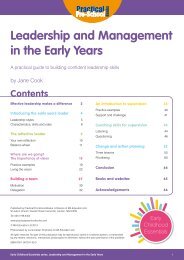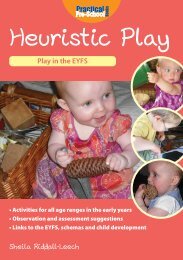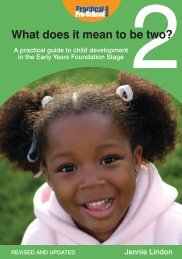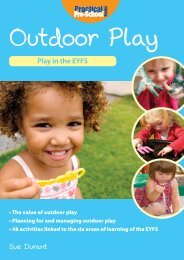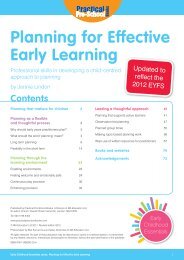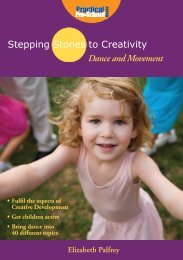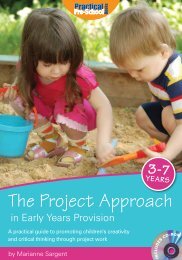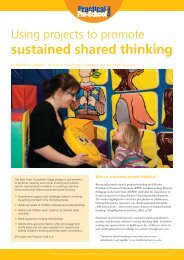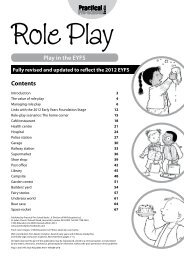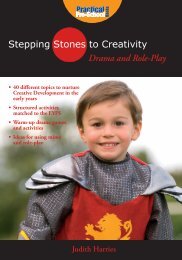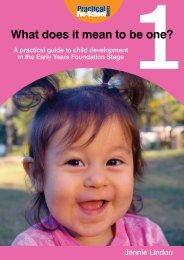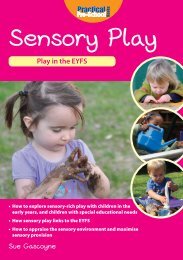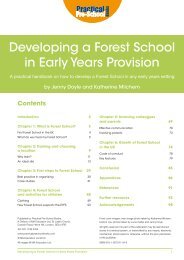Planning for Effective Early Learning - Practical Pre-School Books
Planning for Effective Early Learning - Practical Pre-School Books
Planning for Effective Early Learning - Practical Pre-School Books
Create successful ePaper yourself
Turn your PDF publications into a flip-book with our unique Google optimized e-Paper software.
Chapter 3<br />
Leading a thoughtful<br />
approach<br />
Managers and other senior practitioners are responsible <strong>for</strong><br />
guiding the early years team towards an approach to planning<br />
that genuinely supports young learning. Practitioners who<br />
usually work alone, such as childminders, can feel isolated over<br />
this kind of professional reflection. So, it is important to draw on<br />
available local support such as early years advisors with special<br />
responsibility <strong>for</strong> the childminding service and local networks.<br />
<strong>Planning</strong> that supports<br />
active learners<br />
Part of the senior role has to be a clear understanding of what<br />
is, and is not, required in the national early years framework<br />
that applies to your part of the UK. The national early years<br />
frameworks across the UK all expect that practitioners will<br />
exercise their skills of planning. The details vary between the<br />
four countries of the UK: the <strong>Early</strong> Years Foundation Stage<br />
(EYFS) in England (DCSF, 2008), the Foundation Phase in<br />
Wales (Welsh Assembly Government, 2008), the Curriculum in<br />
Excellence in Scotland (The Scottish Government, 2008) and<br />
the possibilities in the <strong>Early</strong> Years (0-6) Strategy in process in<br />
Northern Ireland (Department of Education, 2010).<br />
Managers and senior practitioners have to become familiar<br />
with the early years framework that applies to them. The task is<br />
very often to be crystal clear about what is non-negotiable: the<br />
statutory part of any framework. These requirements are different<br />
from guidance: the part of a pack or additional publications that<br />
provide explanations, ideas, suggestions and maybe specific<br />
examples of practice. For instance, in England the EYFS main<br />
pack included both a statutory section and a guidance section,<br />
supplemented by the Principles into Practice cards. Many<br />
other booklets and CDs followed from the National Strategies<br />
team. These were all guidance documents, although they have<br />
sometimes been discussed as if everyone has to follow any<br />
suggested pro<strong>for</strong>ma <strong>for</strong> observation, recording and planning.<br />
Within their different <strong>for</strong>mats the different early years statutory<br />
frameworks have strands in common that apply to planning:<br />
• The importance of learning through the medium of play<br />
within early childhood – with a balance between experiences<br />
planned by adults and children’s self-chosen play.<br />
• <strong>Planning</strong> by practitioners should pay close attention to the<br />
interests and current development of individual children.<br />
• This observation-led planning should enable young children<br />
to stretch beyond their current skills and understanding, but<br />
should not impose unrealistic expectations.<br />
• Forward planning should place equal value on all the areas<br />
of learning <strong>for</strong> development over early childhood, as they are<br />
described in this framework.<br />
• <strong>Planning</strong> and evaluation of experiences should acknowledge<br />
how a positive experience <strong>for</strong> young children will support<br />
more than one area of learning.<br />
Leading a team, or thinking deeply about your own practice,<br />
involves reflection around what these key strands mean and<br />
how some beliefs about planning could disrupt young learning.<br />
For instance, a positive focus on learning through play can<br />
be undermined by some interpretations of phrases much<br />
used in documents such as ‘well planned play’ or ‘structured<br />
play’. The more adult-dominated approaches to planning risk<br />
imposing so much structure onto an alleged play activity that<br />
any playfulness has been organised out of the experience<br />
(Lindon, 2001 and 2010b). A developmentally appropriate<br />
interpretation of planning around play leads to experiences<br />
that familiar practitioners have organised on the basis of<br />
knowledge of these young children, who then enjoy this time.<br />
It is never good early years practice when everything has been<br />
decided, by the adults, be<strong>for</strong>e children ever get their eyes and<br />
<strong>Early</strong> Childhood Essentials series: <strong>Planning</strong> <strong>for</strong> <strong>Effective</strong> <strong>Early</strong> <strong>Learning</strong> 41



